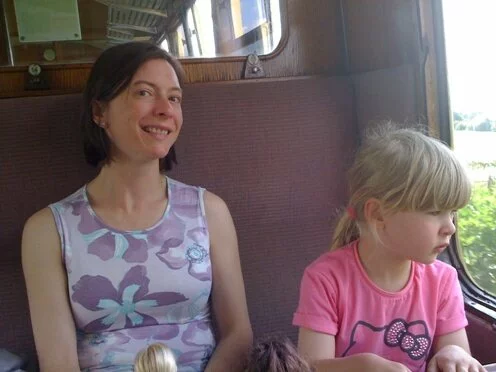Eva will be five on Wednesday! Five! So to celebrate, here are some pictures from a steam railway we visited last month. Eva loved it, and it took me right back to my first job down the local pit back in ’89, when I would smell the steam from the mine’s tank engine as I walked up the lane every morning. Bliss.
Within seconds of arriving the engine shocked her with a big wheesh, but once she got used to all the tooting Eva began to study the soot on her hand and the horses and cricketers we were clickety-clacking past. This was the Chinnor to Princes Risborough railway, and the whole experience was as perfect an English Countryside postcard as I’ve ever seen. Kites of the carniverous kind circled above us, on the lookout for fieldmice, and the steam & sunshine combined to throw us all half a century back in time.

It was a rural idyll I found hard to leave, but then I am 40, and nostalgia is edging into my reality like vaseline on a lens. I’m watching ‘Butterflies’ on G.O.L.D. as we speak, for God’s sake, just for an injection of 80′s stasis. Yep, I want the world to stop – if not reverse - so I can keep up, but maybe Eva can help with that in an odd way. She’s just called me for one of our very rare phone chats. ”I love you” she sing songs, and my heart puddles. She’s a very guileless girl, and her autism will probably keep her that way. Autistic kids tell it like it is, and that can be as tactless (“you’re very fat”) or as beautiful as anything you can imagine. ASD preserves their innocence more effectively than any TV rationing. Would I want to change that? Would I trade a ‘normal’ Eva for a Spectrum Eva? It’s a pointless hypothetical. Eva is Eva. But, on the 9th June, scientists made a breakthrough that could eventually lead to a ‘normalising’ treatment, and it’s a breakthrough that finally traces the cause of Autism to its genetic foundation.

Basically, boffins used to expect our DNA to contain two copies of each gene – one from each parent. But now it appears that we can have more than two copies – three or four, in fact - and be missing some genes entirely. These are called ‘Copy Number Variations’ (or CNVs) and they can have a significant effect on biological function. Deletions of specific genes have been associated with the risk of prostate cancer, for example, while duplications have been linked to Crohn’s disease. Doctors are so excited because a cure could eventually be as simple as correcting a gene variation. As well as cancers, it could also potentially eradicate neurological ‘defects’ like schizophrenia and autism.
They’ve discovered that autistic people have up to 20% more CNVs than normal, and that most of these are not copies of parental genes; they’re what scientists call ’de novo’ - brand new genetic material. It means children on the spectrum are genetically more unique, but it also means that autism might be inherited in only a minority of cases. Most of the time it’s originating in the autistic child, with no parental link whatsoever.
They were also able to track autism to a specific region of chromosome 16 that deals with neurodevelopment. Individuals with a CNV in that exact area are 100 times more likely to be autistic.
Last month’s report built on this by identifying new ‘autism susceptibility genes’, some of which belong to ‘synapse-related pathways’, while others are involved in ‘cellular proliferation, projection and motility, and intracellular signaling’. I have absolutely no idea what these are, but they’re known targets that could easily lead to the development of new treatments, as well as effective tests that should, once and for all, eliminate the lengthy behavioural analysis that plagues current diagnosis.
So. Progress. And a kick in the teeth to the anti-vaccine brigade. But the question remains: what would I say if they ever isolated what makes Eva who she is and asked me if I’d like to eliminate it? What would Eva say herself, if she were aware? Would we trade all her originality for a  ‘normal’ life with a husband & kids she might not want and a job she might never like? Even now, at school, everyone looks at her like a wonderous oddity, capable of saying anything at anytime to anyone – unfettered and free in a way that feels unreachable even to her peers. Her solitary play may make her vulnerable to bullying, but I think her classmates are aware that she’s almost brutally devoid of machinations – that she cannot see the unwritten laws of the playground and so is apt to stamp all over them to get what she wants or protect those she considers friends. She is a beautiful law of nature.
‘normal’ life with a husband & kids she might not want and a job she might never like? Even now, at school, everyone looks at her like a wonderous oddity, capable of saying anything at anytime to anyone – unfettered and free in a way that feels unreachable even to her peers. Her solitary play may make her vulnerable to bullying, but I think her classmates are aware that she’s almost brutally devoid of machinations – that she cannot see the unwritten laws of the playground and so is apt to stamp all over them to get what she wants or protect those she considers friends. She is a beautiful law of nature.
Would I ever let that uniqueness be washed away by a jab? Never. Happy Birthday my love.
“Nostalgia is edging into my reality like vaseline on a lens” *doffs cap*
Mike I found this very interesting – firstly in the advancement of genetic research, and secondly quite moving since your love for Sofia, despite all, shines through the whole article.
Similar advances have been made in the Treacher Collins field – we have now found the chromosones responsible, and future developments will, sooner or later, make this syndrome extinct.
There has always been the issue with me that any children I have have a 50% chance of inheriting my TC. This poses the question to me – is it right to bring a child into this world knowing this fact, and the disadvantages that child would face. Luckily I am not particularly maternal, so this decision has never had to be made. It certainly gives food for thought.
Hope Sofia has a lovely 5th b’day – cant believe she’s 5 already – enjoy her while she is young !!!!!!
Love to u all.
xxx
Thanks Lissy, and thanks for the card – Sofia loved it. I’ll be posting some pix up on FB soon. It’s her school play today and she’s Swan #2 and has one line to memorise: “But we must. For what do we have if we don’t have hope.”
I think this genetic thing is amazing, and it might be able to give parents the information they need to make those tricky family planning decisions. If people want to start a family they want to start a family. At the moment there’s always the possibility that the child might not inherit any difficulties, but in the future I think they’ll be able to say for certain either way. Right now a prospective parent can, with hope, shift the ethical dimension to one side, but soon they’ll have to tackle it head on. I don’t know what I’d say to be honest.
Thanks again for the card and comments though. Big kisses from Sofia!